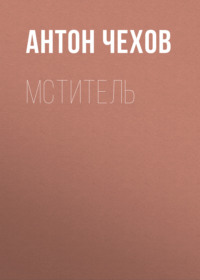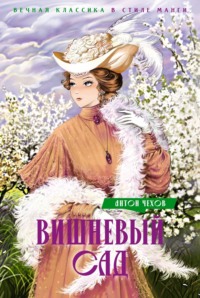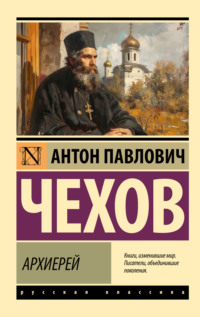 полная версия
полная версияThe Chorus Girl and Other Stories
The plasterers spoke of the foreman, and of a certain Fyodot Vasilyev. I did not understand, and gradually I was overcome by depression – the physical depression in which one is conscious of one's arms and legs and huge body, and does not know what to do with them or where to put them.
After I had been walking about for at least a couple of hours, I noticed that there were telegraph poles running off to the right from the station, and that they ended a mile or a mile and a half away at a white stone wall. The workmen told me the office was there, and at last I reflected that that was where I ought to go.
It was a very old manor house, deserted long ago. The wall round it, of porous white stone, was mouldering and had fallen away in places, and the lodge, the blank wall of which looked out on the open country, had a rusty roof with patches of tin-plate gleaming here and there on it. Within the gates could be seen a spacious courtyard overgrown with rough weeds, and an old manor house with sunblinds on the windows, and a high roof red with rust. Two lodges, exactly alike, stood one on each side of the house to right and to left: one had its windows nailed up with boards; near the other, of which the windows were open, there was washing on the line, and there were calves moving about. The last of the telegraph poles stood in the courtyard, and the wire from it ran to the window of the lodge, of which the blank wall looked out into the open country. The door stood open; I went in. By the telegraph apparatus a gentleman with a curly dark head, wearing a reefer coat made of sailcloth, was sitting at a table; he glanced at me morosely from under his brows, but immediately smiled and said:
"Hullo, Better-than-nothing!"
It was Ivan Tcheprakov, an old schoolfellow of mine, who had been expelled from the second class for smoking. We used at one time, during autumn, to catch goldfinches, finches, and linnets together, and to sell them in the market early in the morning, while our parents were still in their beds. We watched for flocks of migrating starlings and shot at them with small shot, then we picked up those that were wounded, and some of them died in our hands in terrible agonies (I remember to this day how they moaned in the cage at night); those that recovered we sold, and swore with the utmost effrontery that they were all cocks. On one occasion at the market I had only one starling left, which I had offered to purchasers in vain, till at last I sold it for a farthing. "Anyway, it's better than nothing," I said to comfort myself, as I put the farthing in my pocket, and from that day the street urchins and the schoolboys called after me: "Better-than-nothing"; and to this day the street boys and the shopkeepers mock at me with the nickname, though no one remembers how it arose.
Tcheprakov was not of robust constitution: he was narrow-chested, round-shouldered, and long-legged. He wore a silk cord for a tie, had no trace of a waistcoat, and his boots were worse than mine, with the heels trodden down on one side. He stared, hardly even blinking, with a strained expression, as though he were just going to catch something, and he was always in a fuss.
"You wait a minute," he would say fussily. "You listen..
Whatever was I talking about?"
We got into conversation. I learned that the estate on which I now was had until recently been the property of the Tcheprakovs, and had only the autumn before passed into the possession of Dolzhikov, who considered it more profitable to put his money into land than to keep it in notes, and had already bought up three good-sized mortgaged estates in our neighbourhood. At the sale Tcheprakov's mother had reserved for herself the right to live for the next two years in one of the lodges at the side, and had obtained a post for her son in the office.
"I should think he could buy!" Tcheprakov said of the engineer. "See what he fleeces out of the contractors alone! He fleeces everyone!"
Then he took me to dinner, deciding fussily that I should live with him in the lodge, and have my meals from his mother.
"She is a bit stingy," he said, "but she won't charge you much."
It was very cramped in the little rooms in which his mother lived; they were all, even the passage and the entry, piled up with furniture which had been brought from the big house after the sale; and the furniture was all old-fashioned mahogany. Madame Tcheprakov, a very stout middle-aged lady with slanting Chinese eyes, was sitting in a big arm-chair by the window, knitting a stocking. She received me ceremoniously.
"This is Poloznev, mamma," Tcheprakov introduced me. "He is going to serve here."
"Are you a nobleman?" she asked in a strange, disagreeable voice: it seemed to me to sound as though fat were bubbling in her throat.
"Yes," I answered.
"Sit down."
The dinner was a poor one. Nothing was served but pies filled with bitter curd, and milk soup. Elena Nikiforovna, who presided, kept blinking in a queer way, first with one eye and then with the other. She talked, she ate, but yet there was something deathly about her whole figure, and one almost fancied the faint smell of a corpse. There was only a glimmer of life in her, a glimmer of consciousness that she had been a lady who had once had her own serfs, that she was the widow of a general whom the servants had to address as "your Excellency"; and when these feeble relics of life flickered up in her for an instant she would say to her son:
"Jean, you are not holding your knife properly!"
Or she would say to me, drawing a deep breath, with the mincing air of a hostess trying to entertain a visitor:
"You know we have sold our estate. Of course, it is a pity, we are used to the place, but Dolzhikov has promised to make Jean stationmaster of Dubetchnya, so we shall not have to go away; we shall live here at the station, and that is just the same as being on our own property! The engineer is so nice! Don't you think he is very handsome?"
Until recently the Tcheprakovs had lived in a wealthy style, but since the death of the general everything had been changed. Elena Nikiforovna had taken to quarrelling with the neighbours, to going to law, and to not paying her bailiffs or her labourers; she was in constant terror of being robbed, and in some ten years Dubetchnya had become unrecognizable.
Behind the great house was an old garden which had already run wild, and was overgrown with rough weeds and bushes. I walked up and down the verandah, which was still solid and beautiful; through the glass doors one could see a room with parquetted floor, probably the drawing-room; an old-fashioned piano and pictures in deep mahogany frames – there was nothing else. In the old flower-beds all that remained were peonies and poppies, which lifted their white and bright red heads above the grass. Young maples and elms, already nibbled by the cows, grew beside the paths, drawn up and hindering each other's growth. The garden was thickly overgrown and seemed impassable, but this was only near the house where there stood poplars, fir-trees, and old limetrees, all of the same age, relics of the former avenues. Further on, beyond them the garden had been cleared for the sake of hay, and here it was not moist and stuffy, and there were no spiders' webs in one's mouth and eyes. A light breeze was blowing. The further one went the more open it was, and here in the open space were cherries, plums, and spreading apple-trees, disfigured by props and by canker; and pear-trees so tall that one could not believe they were pear-trees. This part of the garden was let to some shopkeepers of the town, and it was protected from thieves and starlings by a feeble-minded peasant who lived in a shanty in it.
The garden, growing more and more open, till it became definitely a meadow, sloped down to the river, which was overgrown with green weeds and osiers. Near the milldam was the millpond, deep and full of fish; a little mill with a thatched roof was working away with a wrathful sound, and frogs croaked furiously. Circles passed from time to time over the smooth, mirror-like water, and the water-lilies trembled, stirred by the lively fish. On the further side of the river was the little village Dubetchnya. The still, blue millpond was alluring with its promise of coolness and peace. And now all this – the millpond and the mill and the snug-looking banks – belonged to the engineer!
And so my new work began. I received and forwarded telegrams, wrote various reports, and made fair copies of the notes of requirements, the complaints, and the reports sent to the office by the illiterate foremen and workmen. But for the greater part of the day I did nothing but walk about the room waiting for telegrams, or made a boy sit in the lodge while I went for a walk in the garden, until the boy ran to tell me that there was a tapping at the operating machine. I had dinner at Madame Tcheprakov's. Meat we had very rarely: our dishes were all made of milk, and Wednesdays and Fridays were fast days, and on those days we had pink plates which were called Lenten plates. Madame Tcheprakov was continually blinking – it was her invariable habit, and I always felt ill at ease in her presence.
As there was not enough work in the lodge for one, Tcheprakov did nothing, but simply dozed, or went with his gun to shoot ducks on the millpond. In the evenings he drank too much in the village or the station, and before going to bed stared in the looking-glass and said: "Hullo, Ivan Tcheprakov."
When he was drunk he was very pale, and kept rubbing his hands and laughing with a sound like a neigh: "hee-hee-hee!" By way of bravado he used to strip and run about the country naked. He used to eat flies and say they were rather sour.
IV
One day, after dinner, he ran breathless into the lodge and said:
"Go along, your sister has come."
I went out, and there I found a hired brake from the town standing before the entrance of the great house. My sister had come in it with Anyuta Blagovo and a gentleman in a military tunic. Going up closer I recognized the latter: it was the brother of Anyuta Blagovo, the army doctor.
"We have come to you for a picnic," he said; "is that all right?"
My sister and Anyuta wanted to ask how I was getting on here, but both were silent, and simply gazed at me. I was silent too. They saw that I did not like the place, and tears came into my sister's eyes, while Anyuta Blagovo turned crimson.
We went into the garden. The doctor walked ahead of us all and said enthusiastically:
"What air! Holy Mother, what air!"
In appearance he was still a student. And he walked and talked like a student, and the expression of his grey eyes was as keen, honest, and frank as a nice student's. Beside his tall and handsome sister he looked frail and thin; and his beard was thin too, and his voice, too, was a thin but rather agreeable tenor. He was serving in a regiment somewhere, and had come home to his people for a holiday, and said he was going in the autumn to Petersburg for his examination as a doctor of medicine. He was already a family man, with a wife and three children, he had married very young, in his second year at the University, and now people in the town said he was unhappy in his family life and was not living with his wife.
"What time is it?" my sister asked uneasily. "We must get back in good time. Papa let me come to see my brother on condition I was back at six."
"Oh, bother your papa!" sighed the doctor.
I set the samovar. We put down a carpet before the verandah of the great house and had our tea there, and the doctor knelt down, drank out of his saucer, and declared that he now knew what bliss was. Then Tcheprakov came with the key and opened the glass door, and we all went into the house. There it was half dark and mysterious, and smelt of mushrooms, and our footsteps had a hollow sound as though there were cellars under the floor. The doctor stopped and touched the keys of the piano, and it responded faintly with a husky, quivering, but melodious chord; he tried his voice and sang a song, frowning and tapping impatiently with his foot when some note was mute. My sister did not talk about going home, but walked about the rooms and kept saying:
"How happy I am! How happy I am!"
There was a note of astonishment in her voice, as though it seemed to her incredible that she, too, could feel light-hearted. It was the first time in my life I had seen her so happy. She actually looked prettier. In profile she did not look nice; her nose and mouth seemed to stick out and had an expression as though she were pouting, but she had beautiful dark eyes, a pale, very delicate complexion, and a touching expression of goodness and melancholy, and when she talked she seemed charming and even beautiful. We both, she and I, took after our mother, were broad shouldered, strongly built, and capable of endurance, but her pallor was a sign of ill-health; she often had a cough, and I sometimes caught in her face that look one sees in people who are seriously ill, but for some reason conceal the fact. There was something naïve and childish in her gaiety now, as though the joy that had been suppressed and smothered in our childhood by harsh education had now suddenly awakened in her soul and found a free outlet.
But when evening came on and the horses were brought round, my sister sank into silence and looked thin and shrunken, and she got into the brake as though she were going to the scaffold.
When they had all gone, and the sound had died away.. I remembered that Anyuta Blagovo had not said a word to me all day.
"She is a wonderful girl!" I thought. "Wonderful girl!"
St. Peter's fast came, and we had nothing but Lenten dishes every day. I was weighed down by physical depression due to idleness and my unsettled position, and dissatisfied with myself. Listless and hungry, I lounged about the garden and only waited for a suitable mood to go away.
Towards evening one day, when Radish was sitting in the lodge, Dolzhikov, very sunburnt and grey with dust, walked in unexpectedly. He had been spending three days on his land, and had come now to Dubetchnya by the steamer, and walked to us from the station. While waiting for the carriage, which was to come for him from the town, he walked round the grounds with his bailiff, giving orders in a loud voice, then sat for a whole hour in our lodge, writing letters. While he was there telegrams came for him, and he himself tapped off the answers. We three stood in silence at attention.
"What a muddle!" he said, glancing contemptuously at a record book. "In a fortnight I am transferring the office to the station, and I don't know what I am to do with you, my friends."
"I do my best, your honour," said Tcheprakov.
"To be sure, I see how you do your best. The only thing you can do is to take your salary," the engineer went on, looking at me; "you keep relying on patronage to faire le carrière as quickly and as easily as possible. Well, I don't care for patronage. No one took any trouble on my behalf. Before they gave me a railway contract I went about as a mechanic and worked in Belgium as an oiler. And you, Panteley, what are you doing here?" he asked, turning to Radish. "Drinking with them?"
He, for some reason, always called humble people Panteley, and such as me and Tcheprakov he despised, and called them drunkards, beasts, and rabble to their faces. Altogether he was cruel to humble subordinates, and used to fine them and turn them off coldly without explanations.
At last the horses came for him. As he said good-bye he promised to turn us all off in a fortnight; he called his bailiff a blockhead; and then, lolling at ease in his carriage, drove back to the town.
"Andrey Ivanitch," I said to Radish, "take me on as a workman."
"Oh, all right!"
And we set off together in the direction of the town. When the station and the big house with its buildings were left behind I asked: "Andrey Ivanitch, why did you come to Dubetchnya this evening?"
"In the first place my fellows are working on the line, and in the second place I came to pay the general's lady my interest. Last year I borrowed fifty roubles from her, and I pay her now a rouble a month interest."
The painter stopped and took me by the button.
"Misail Alexeyitch, our angel," he went on. "The way I look at it is that if any man, gentle or simple, takes even the smallest interest, he is doing evil. There cannot be truth and justice in such a man."
Radish, lean, pale, dreadful-looking, shut his eyes, shook his head, and, in the tone of a philosopher, pronounced:
"Lice consume the grass, rust consumes the iron, and lying the soul.
Lord, have mercy upon us sinners."
V
Radish was not practical, and was not at all good at forming an estimate; he took more work than he could get through, and when calculating he was agitated, lost his head, and so was almost always out of pocket over his jobs. He undertook painting, glazing, paperhanging, and even tiling roofs, and I can remember his running about for three days to find tilers for the sake of a paltry job. He was a first-rate workman; he sometimes earned as much as ten roubles a day; and if it had not been for the desire at all costs to be a master, and to be called a contractor, he would probably have had plenty of money.
He was paid by the job, but he paid me and the other workmen by the day, from one and twopence to two shillings a day. When it was fine and dry we did all kinds of outside work, chiefly painting roofs. When I was new to the work it made my feet burn as though I were walking on hot bricks, and when I put on felt boots they were hotter than ever. But this was only at first; later on I got used to it, and everything went swimmingly. I was living now among people to whom labour was obligatory, inevitable, and who worked like cart-horses, often with no idea of the moral significance of labour, and, indeed, never using the word "labour" in conversation at all. Beside them I, too, felt like a cart-horse, growing more and more imbued with the feeling of the obligatory and inevitable character of what I was doing, and this made my life easier, setting me free from all doubt and uncertainty.
At first everything interested me, everything was new, as though I had been born again. I could sleep on the ground and go about barefoot, and that was extremely pleasant; I could stand in a crowd of the common people and be no constraint to anyone, and when a cab horse fell down in the street I ran to help it up without being afraid of soiling my clothes. And the best of it all was, I was living on my own account and no burden to anyone!
Painting roofs, especially with our own oil and colours, was regarded as a particularly profitable job, and so this rough, dull work was not disdained, even by such good workmen as Radish. In short breeches, and wasted, purple-looking legs, he used to go about the roofs, looking like a stork, and I used to hear him, as he plied his brush, breathing heavily and saying: "Woe, woe to us sinners!"
He walked about the roofs as freely as though he were upon the ground. In spite of his being ill and pale as a corpse, his agility was extraordinary: he used to paint the domes and cupolas of the churches without scaffolding, like a young man, with only the help of a ladder and a rope, and it was rather horrible when standing on a height far from the earth; he would draw himself up erect, and for some unknown reason pronounce:
"Lice consume grass, rust consumes iron, and lying the soul!"
Or, thinking about something, would answer his thoughts aloud:
"Anything may happen! Anything may happen!"
When I went home from my work, all the people who were sitting on benches by the gates, all the shopmen and boys and their employers, made sneering and spiteful remarks after me, and this upset me at first and seemed to be simply monstrous.
"Better-than-nothing!" I heard on all sides. "House painter! Yellow ochre!"
And none behaved so ungraciously to me as those who had only lately been humble people themselves, and had earned their bread by hard manual labour. In the streets full of shops I was once passing an ironmonger's when water was thrown over me as though by accident, and on one occasion someone darted out with a stick at me, while a fishmonger, a grey-headed old man, barred my way and said, looking at me angrily:
"I am not sorry for you, you fool! It's your father I am sorry for."
And my acquaintances were for some reason overcome with embarrassment when they met me. Some of them looked upon me as a queer fish and a comic fool; others were sorry for me; others did not know what attitude to take up to me, and it was difficult to make them out. One day I met Anyuta Blagovo in a side street near Great Dvoryansky Street. I was going to work, and was carrying two long brushes and a pail of paint. Recognizing me Anyuta flushed crimson.
"Please do not bow to me in the street," she said nervously, harshly, and in a shaking voice, without offering me her hand, and tears suddenly gleamed in her eyes. "If to your mind all this is necessary, so be it.. so be it, but I beg you not to meet me!"
I no longer lived in Great Dvoryansky Street, but in the suburb with my old nurse Karpovna, a good-natured but gloomy old woman, who always foreboded some harm, was afraid of all dreams, and even in the bees and wasps that flew into her room saw omens of evil, and the fact that I had become a workman, to her thinking, boded nothing good.
"Your life is ruined," she would say, mournfully shaking her head, "ruined."
Her adopted son Prokofy, a huge, uncouth, red-headed fellow of thirty, with bristling moustaches, a butcher by trade, lived in the little house with her. When he met me in the passage he would make way for me in respectful silence, and if he was drunk he would salute me with all five fingers at once. He used to have supper in the evening, and through the partition wall of boards I could hear him clear his throat and sigh as he drank off glass after glass.
"Mamma," he would call in an undertone.
"Well," Karpovna, who was passionately devoted to her adopted son, would respond: "What is it, sonny?"
"I can show you a testimony of my affection, mamma. All this earthly life I will cherish you in your declining years in this vale of tears, and when you die I will bury you at my expense; I have said it, and you can believe it."
I got up every morning before sunrise, and went to bed early. We house painters ate a great deal and slept soundly; the only thing amiss was that my heart used to beat violently at night. I did not quarrel with my mates. Violent abuse, desperate oaths, and wishes such as, "Blast your eyes," or "Cholera take you," never ceased all day, but, nevertheless, we lived on very friendly terms. The other fellows suspected me of being some sort of religious sectary, and made good-natured jokes at my expense, saying that even my own father had disowned me, and thereupon would add that they rarely went into the temple of God themselves, and that many of them had not been to confession for ten years. They justified this laxity on their part by saying that a painter among men was like a jackdaw among birds.
The men had a good opinion of me, and treated me with respect; it was evident that my not drinking, not smoking, but leading a quiet, steady life pleased them very much. It was only an unpleasant shock to them that I took no hand in stealing oil and did not go with them to ask for tips from people on whose property we were working. Stealing oil and paints from those who employed them was a house painter's custom, and was not regarded as theft, and it was remarkable that even so upright a man as Radish would always carry away a little white lead and oil as he went home from work. And even the most respectable old fellows, who owned the houses in which they lived in the suburb, were not ashamed to ask for a tip, and it made me feel vexed and ashamed to see the men go in a body to congratulate some nonentity on the commencement or the completion of the job, and thank him with degrading servility when they had received a few coppers.
With people on whose work they were engaged they behaved like wily courtiers, and almost every day I was reminded of Shakespeare's Polonius.
"I fancy it is going to rain," the man whose house was being painted would say, looking at the sky.









